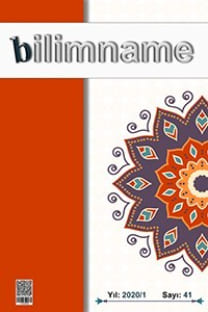MU‘ALLÂKA SAHİBİ MÜSLÜMAN ŞAİR LEBÎD B. RABÎ'A VE DÎVÂNINDAKİ FAHR TEMALI ŞİİRLERİ
İslâm'ın ilk asrında, ilimden edebiyata, tarihten sanata, kısaca hayatın bütününe Kur'an'ın etkisi damga vurmuştur. İnsanlara ve cinlere meydan okuyan Kur'an, şiir ve edebiyata da tesir etmiş; onu daha iyi anlama çabaları birçok ilimle birlikte Arap belagatini de oluşturmuştur. Onun tebliğcisi ve uygulayıcısı Hz. Peygamber'in takdir ettiği şairlerden biri de Lebîd b. Rabî‘a'dır. O, İmruu'l-Kays, Tarafe b. el-‘Abd, Zuheyr b. Ebî Sulma ve ‘Amr b. Kulsum ile birlikte, üzerinde ittifak olan beş mu‘allâka sahibinden biri olup, bunlar içerisinde Müslüman olan tek şairdir. Altıncı yüzyılın ikinci yarısında dünyaya gelmiş, yüz seneyi aşkın yaşayarak, Muâviye döneminde vefat etmiştir. Şiirleri, Araplar tarafından çok takdir edilen Lebîd'in, İslâm'a girdikten sonra şiir söylemeyi bıraktığı veya çok az şiir söylediği nakledilir. Onun İslâmiyet dönemindeki şiirlerine bakıldığında, Kur’an-ı Kerim’in tesirinde kaldığı açıkça görülür. Şiirlerinde tabiat ve hayvan tasvirlerinin yanı sıra hanîf dininin bazı değerlerine de rastlanır. Ona ait müstakil bir medih şiiri yoksa da; özellikle Câhiliyye dönemindeki şiirlerinde fahr teması baskındır. Mersiye, vasf, hiciv ve hikmet türünde de birçok şiiri olan Lebîd, fahr türüne dâhil olan şiirlerinde daha çok kendisiyle, ailesiyle, kabilesiyle ve atalarıyla övünerek, bu temayı ustalıkla işlemiştir. Bu çalışma, onun hayatı ve şiirine dair kesitler sunduktan sonra, Dîvân'ındaki fahr konulu şiirlerinden örnekler sunmayı ve onun İslâmiyet öncesi ve sonrası dönemlerini mukayese etmeyi hedeflemektedir.
MUSLIM POET LABÎD B. RABÎA, THE OWNER OF THE MU‘ALLAKA, AND PRAISE THEMED POEMS
Poetry is the reflection of the inner world of man. It is a style of expressing emotions and thoughts enthusiastic and extraordinary. It has always been one of the most effective means of communication, be it rhythm and rhyme or free scale. Poetry is also a mirror of a person and his period. Because it reflects the literary pleasure of the poet by feeding from the mood, geography and culture. Poetry, which is more or less influential in every society in expressing feelings and thoughts, is the most comprehensive and powerful reflector of life, especially in the pre-Islamic Arab society. What today's media and social networking sites have the same effect as the poem of that day. Poetry contests and poet contests are the most suitable environments where tribes pride themselves against each other and embark on a competition for superiority. The first century of Islam has been a turning point for humanity throughout life, from science to literature, history, law, culture, art and morality. This has been realized by the influence of the Qur'an, which was first sent down to the Messenger of Allah. In this period, the influence of the Qur'an was marked by science, literature, history, art, and the whole life. The Koran, which challenges people and demons, has influenced poetry and literature; the efforts to better understand it, together with many sciences, have also formed the Arab eloquence. Arabic literature in general and Arabic poetry in particular have shown many important changes with the advent of Islam. The change is more about content, rather than form and form. Islam did not approve of every poem in principle with the expression of Surah al-Shuarah. When poetry took a destructive nature, it was found harmful and deteriorated. The first condition that a poem is acceptable is that it is not contrary to monotheism and morality in general.
___
- Aslan, A. Turan. “Muallaka Şairlerinden Lebîd b. Rabîa ve Muallâka’sı”. İlim ve Sanat 21 (1988): 43-46.
Cumahî, İbn Sellâm. Tabakâtu fuhûli'ş-şu‘arâ’.b.y.: y.y., ts.
